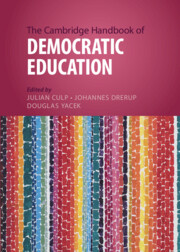Book contents
- The Cambridge Handbook of Democratic Education
- Cambridge Handbooks in Education
- The Cambridge Handbook of Democratic Education
- Copyright page
- Contents
- Contributors
- Acknowledgments
- Introduction
- Part One Historical Perspectives
- Part Two Philosophical and Normative Foundations
- Part Three Key Topics and Concepts
- 16 Educational Justice and Democratic Education
- 17 Global Justice and Democratic Education
- 18 Debate and Deliberation in Democratic Education
- 19 Agonistic Democracy and the Question of Education
- 20 Punishment and Democratic Education
- 21 Children’s Rights and Democratic Education
- 22 Education, Trust, and the Conversation of Democracy
- 23 Patriotism and Democratic Education
- 24 The Voice of Poetry in Cultivating Cosmopolitan and Democratic Imagination
- 25 Disability and Democratic Education
- Part Four Challenges
- Index
- References
23 - Patriotism and Democratic Education
from Part Three - Key Topics and Concepts
Published online by Cambridge University Press: 20 April 2023
- The Cambridge Handbook of Democratic Education
- Cambridge Handbooks in Education
- The Cambridge Handbook of Democratic Education
- Copyright page
- Contents
- Contributors
- Acknowledgments
- Introduction
- Part One Historical Perspectives
- Part Two Philosophical and Normative Foundations
- Part Three Key Topics and Concepts
- 16 Educational Justice and Democratic Education
- 17 Global Justice and Democratic Education
- 18 Debate and Deliberation in Democratic Education
- 19 Agonistic Democracy and the Question of Education
- 20 Punishment and Democratic Education
- 21 Children’s Rights and Democratic Education
- 22 Education, Trust, and the Conversation of Democracy
- 23 Patriotism and Democratic Education
- 24 The Voice of Poetry in Cultivating Cosmopolitan and Democratic Imagination
- 25 Disability and Democratic Education
- Part Four Challenges
- Index
- References
Summary
Whether patriotism has a valuable part to play in the educational system of a democratic society is now a highly contentious matter. This chapter argues that it does, principally because such a society is a kind of cooperative practice that requires its members to enact, enforce, and – in most cases – obey the laws that govern their self-governing polity. Democracies rely on rules, and especially the rule of law, to provide the reasonably clear expectations necessary to coordinate public activities and to overcome collective-action problems. By encouraging citizens to set aside personal advantage and play a cooperative part in democratic life, patriotism contributes to the public spirit essential to democracy. For that reason, promoting patriotic attitudes is a worthy aim of democratic education.
- Type
- Chapter
- Information
- The Cambridge Handbook of Democratic Education , pp. 377 - 394Publisher: Cambridge University PressPrint publication year: 2023

